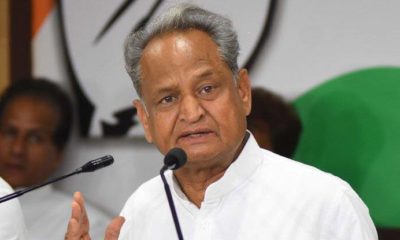World
Obama may not need veto to save Iran nuclear deal

Washington: President Barack Obama again warned the Republican controlled Congress that he would veto any move to derail the landmark Iran nuclear deal, but with several more senators backing it, he may not have to wield his pen.
The deal between Iran and six world powers led by the US has now gained the support of 42 senators – enough to bottle up a resolution of disapproval in the 100 member senate with a filibuster and spare Obama the need to overturn it.
White House, press secretary Josh Earnest said the administration felt
“gratified” by the growing support for the Iran nuclear deal He suggested that the White House expects Democratic supporters to filibuster the vote to disapprove the accord.
Supporters “should take the necessary steps in Congress to prevent Congress from undermining the agreement,” Earnest said.
Even as Obama stood on the brink of a legacy defining foreign policy victory, opponents kept up their tirade against the deal with former Vice President Dick Cheney denouncing it as “madness” and “shameful”.
Calling it a “capitulation” by world powers, he said it “strengthens our adversaries, threatens our allies and puts our own security at risk.”
Meanwhile, the White House warned the Congress as it returned from its summer recess that the enactment of a joint “resolution would greatly undermine our national security interests on multiple fronts.”
It would also “deal a devastating blow to America’s credibility as a leader of diplomacy and could ultimately result in the exhaustion of alternatives to military action.”
In selling the deal to the lawmakers, the Obama administration has time and again invoked the support of India saying countries which have paid a hefty economic price would not back the sanctions again if the deal was killed by the Congress.
The new warning came even as four more senators joined the supporters of the deal, taking their number to 42, all of them Democrats or independents who caucus with Democrats.
Announcements in support of the deal Tuesday came from senators Richard Blumenthal, Maria Cantwell, Gary Peters and Ron Wyden, ensuring that the Republicans would not have the 60 votes necessary to close debate on the disapproval resolution.
But Senator Joe Manchin III Tuesday became the fifth Democrat to announce he would vote to disapprove of the deal.
Also Tuesday, the last undecided Senate Republican, Susan Collins, announced her opposition, dashing any White House hopes for bipartisan support.
Faced with the prospect of a filibuster, Republican Majority Leader Mitch McConnell said the Democrats “should not hide behind procedural obfuscation to shield the president or our individual views.
He argued that the Iran disapproval should be decided on a majority vote for final passage, not on a procedural vote requiring 60 senators.
But Democratic Minority Leader Harry Reid cited multiple occasions where McConnell threw up procedural roadblocks when Republicans were in the minority.
Lawmakers have until Sep 17 to weigh in for or against the agreement, when the 60 day review period expires.
Meanwhile, Cheney speaking at the American Enterprise Institute conservative think-tank in Washington Tuesday, blasted the deal saying it will see the “arming and funding (of) Iran while simultaneously providing them a pathway to a nuclear arsenal.”
It “is not an act of peace, is not – as the president claims – the only alternative to war. It’s madness,” Cheney added.
World
Lockdowns in China Force Urban Communities to Defy Censorship and Vent Frustration Online

Shanghai’s rich middle class is leading a wave of online dissent over the strict and prolonged lockdowns imposed in various parts of the country. Chinese internet censorship is struggling as patience is wearing thin in many urban centers, coming up with creative forms of online protests.
Social Media Posts Revealing Lockdown Tension in Shanghai
Drawn-out lockdowns are nothing new in China as authorities insist with the nation’s zero-Covid policy since the start of the pandemic. Currently over This time around, however, metropolitan areas like Shanghai are increasingly difficult to keep quiet, given that its more than 25 million residents have seen weeks of total isolation along with food shortages and many other service interruptions.
Dozens of towns and reportedly over 300 million Chinese citizens have been affected by lockdowns of different severity. As expected, urban netizens have been most outspoken over their difficulties by finding creative ways to get around state censorship and bans placed on topics, news comments and spontaneous campaigns.
Shanghai residents have been using mobile proxies and hijacking seemingly unrelated hashtags to talk about healthcare issues, delivery failures and the overall severity of their situation. The “positive energy” that the Chinese government wants to transmit during the recent prolonged series of lockdowns does not come naturally to those counting food supplies and online censors are working hard to filter words, trending topics and undesired social media sharing.
WeChat groups and message threads are under constant monitoring. Posts questioning the zero-Covid approach have been quickly deleted, including by leading Chinese health experts like Dr. Zhong Nanshan. Video footage is soon censored and protests and investigations are quickly made to disappear.
Where this has not worked, officials have exposed banners with warnings and outright threats like “watch your own mouth or face punishment”, while drones have been patrolling the city skies. Yet, if anything, this has led to further tensions and unspoken confrontation with Shanghai’s educated and affluent middle class.
Creative Online Solutions Harnessing Civic Energy
Announcements by Chinese social media that they would be publishing the IP addresses of users who “spread rumors” have not helped either. Tech industry research has shown that much of Asia’s tech-savvy population has a habit of using mobile proxies and other privacy tools, quickly finding workarounds to browse the internet freely and talk to the world about the hottest topics.
The sheer volume of forbidden posts is already a challenge for the very censorship system, experts explain. Unable to track all trending hashtags, state workers overlook topics that speak about the US, Ukraine or other popular news. Linking human rights elsewhere to their situation, Chinese online dissidents establish their informal channels and “hijack” the conversation to share personal or publicly relevant information about the Covid suppression in their town.
Sarcastic and satirical posts still dominate. Others hope to evade the censors by replacing words from famous poems or the national anthem. One thing is certain – social media, when harnessed with the right creativity, has proven its ability to mount pressure on the government in even some of the most strictly controlled tech environments like China.























